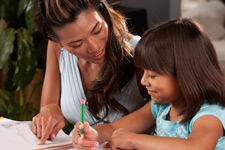Tarea de la Unidad # 3
1.- Seleccione un texto que tenga una imagen. Observe la imagen y conteste las siguientes preguntas.
Parenting Children with Learning Disabilities
TIPS FOR HELPING YOUR CHILD
If your child has been diagnosed with a learning disability, you may immediately begin thinking about school — homework, tests, projects — and wondering how your kid will get through. How can you make sure your child has the best chance to reach his or her full potential? If you slow down for a moment, you may realize that while academic success is important, what you really want for your child is a happy and fulfilling life. Your influence on your child outweighs that of any teacher, tutor, therapist or counselor. If your child has a learning disability, your love, encouragement, and support can make all the difference, helping him or her emerge with a strong sense of self-confidence and the determination to succeed.
2.- De acuerdo al título y la imagen: ¿cuál cree usted que es el tópico que está a punto de leer?
Se trata de niños con problemas de aprendizaje
3.- Luego lea el texto
a.- ¿Cuál es la idea general del texto?
Trata sobre algunos consejos para ayudar a su hijo con discapacidad de aprendizaje; el amor, aliento y apoyo puede marcar la diferencia, ayudándole a salir con un fuerte sentido de la autoconfianza y la determinación para tener éxito.
a.- ¿Cuál es la idea general del texto?
Trata sobre algunos consejos para ayudar a su hijo con discapacidad de aprendizaje; el amor, aliento y apoyo puede marcar la diferencia, ayudándole a salir con un fuerte sentido de la autoconfianza y la determinación para tener éxito.
b.- ¿Que palabras se repiten?
Child, learning, disability
Child, learning, disability
c.- ¿Que palabras se parecen al español?
Proyect, potential, moment, important, difference, immediately
d.- ¿Cuales son las palabras en negrita, el titulo, subtitulo o gráficos que te ayudan a entender el texto?
Parenting Children with Learning Disabilities
TIPS FOR HELPING YOUR CHILD
e.- ¿De qué trata el texto? Lee el primer párrafo y el último o la ultimas ideas del último párrafo.
El primer y segundo párrafo tratan sobre consejos para ayudar a su hijo diagnosticado con discapacidad de aprendizaje; usted puede inmediatamente empezar a pensar en la escuela, las tareas, exámenes, proyectos y preguntándose como su hijo va a pasar; el amor, aliento y apoyo puede marcar la diferencia, ayudándole a salir con un fuerte sentido de la autoconfianza y la determinación para tener éxito.
4.- Seleccione un texto y escribe 4 preguntas puntuales sobre fechas, sitios etc. (utiliza una biografía referente a algún autor de tu área de experticia)
Jean-Jacques Rousseau Biography
Jean-Jacques Rousseau (Geneva, Switzerland, 28 June 1712 – Ermenonville, France, 2 July 1778) was in writer, philosopher and musician defined as an illustrated, a regret of deep contradictions that separated it from the main representatives of the enlightenment.
The ideas of Rousseau influenced policies to a great extent in the French Revolution, the development of Republican theories and the growth of nationalism. His legacy of radical thinker and revolutionary this probably best expressed in his more two famous phrases, one contained in the social contract: "man is born free, but on all sides this chained», La Otra, contained in his Emilio, or education: 'man is good by nature', from there her idea of the possibility of an education.
¿ Cuando nació Jean-Jacques Rousseau?
R= He was born the 28 de june1712 in Geneva,
¿ cuando murió Jean-Jacques Rousseau?
R= Died 02 july 1778 Ermenonville, France
¿ Ocupaciones?
R= was in writer, philosopher and musician
¿ Frases mas celebres de Jean-Jacques Rousseau?
two famous phrases, one contained in the social contract: "man is born free, but on all sides this chained», La Otra, contained in his Emilio, or education: 'man is good by nature', from there her idea of the possibility of an education.

No hay comentarios:
Publicar un comentario